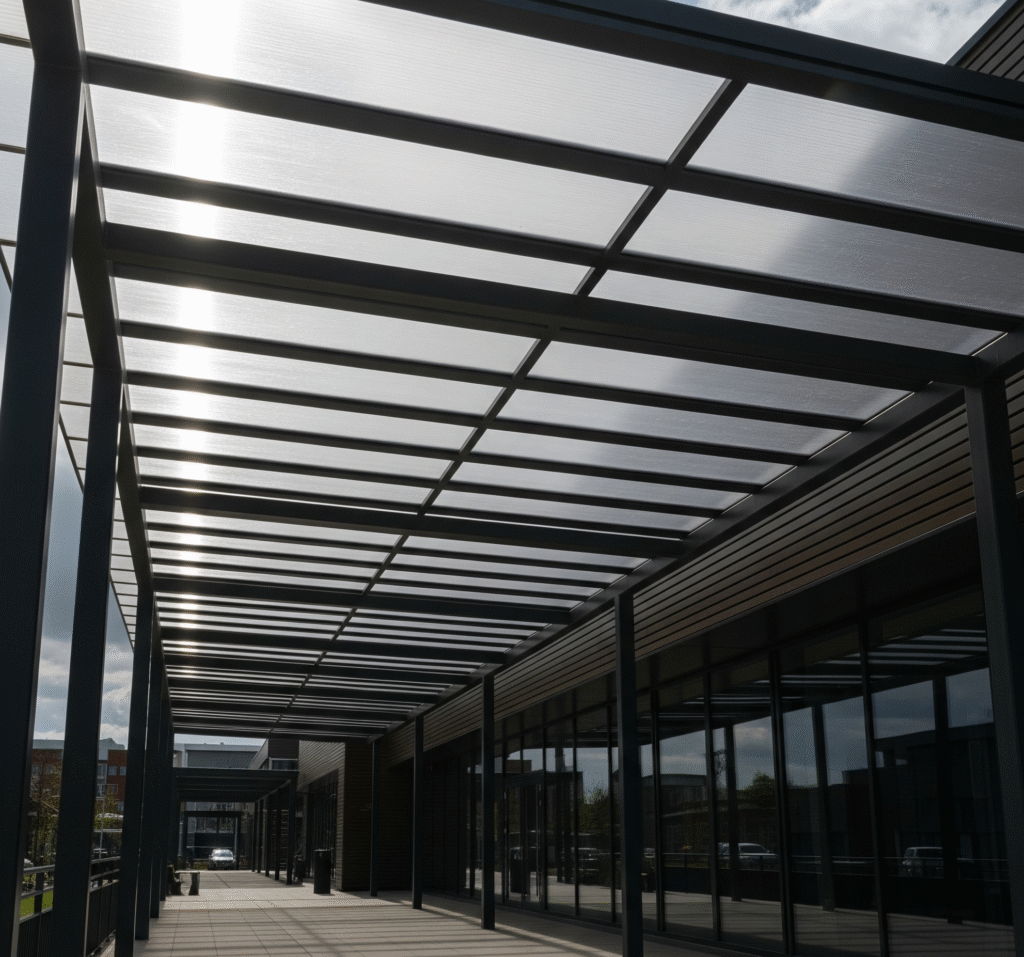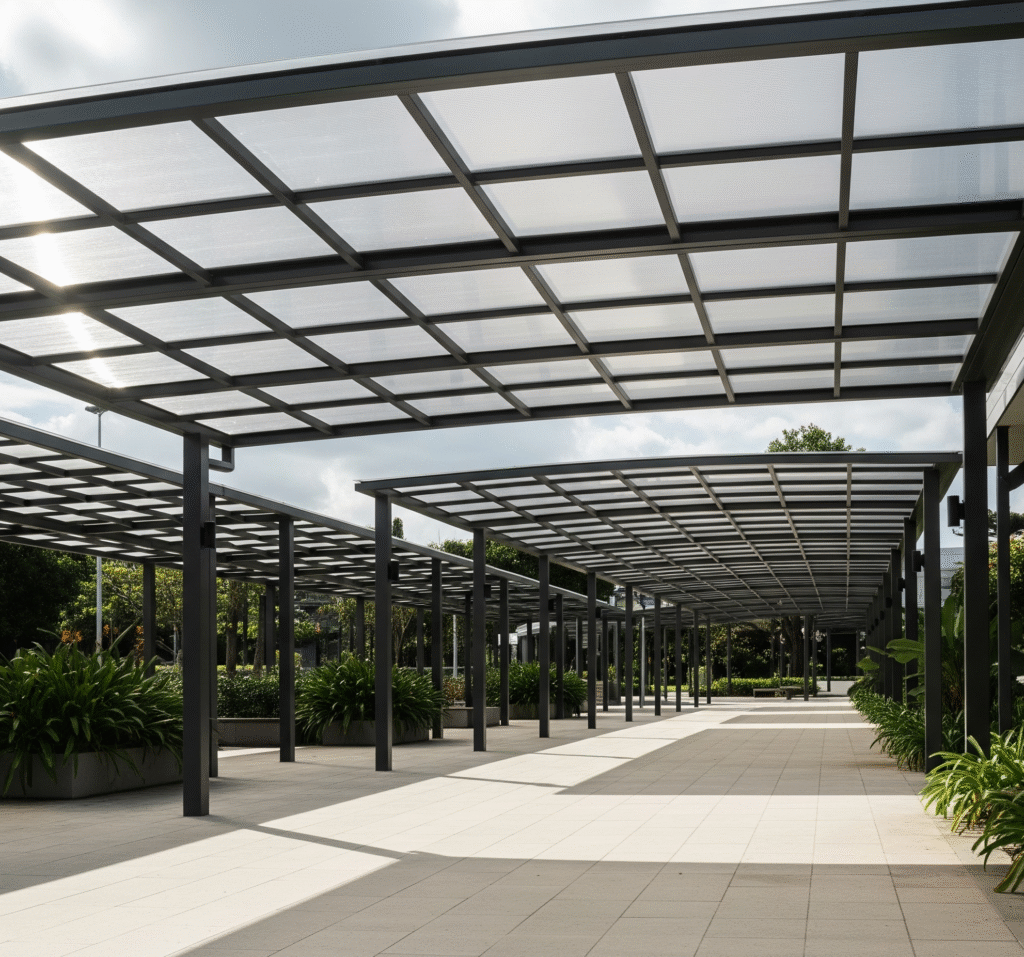A polycarbonate canopy is one of the most advanced architectural solutions today, offering the perfect balance between strength, modern aesthetics, and practical functionality. More than just a shading tool, it has become a strategic choice for businesses, contractors, and project owners looking for a long-lasting product that protects against harsh weather while maintaining a sleek and contemporary appearance. Thanks to its unique properties such as heat and UV insulation, impact resistance, and lightweight design, a polycarbonate canopy is now a superior alternative to glass or traditional metal structures in both residential and commercial applications.

What is a Polycarbonate Canopy?
A polycarbonate canopy is a shading and protective structure made from high-quality polycarbonate sheets, renowned for their resilience against extreme weather while maintaining transparency and flexibility. Unlike glass or heavy metals, these canopies provide a modern and stylish look combined with exceptional durability. With UV protection, heat resistance, and strong impact performance, they are the ideal choice for gardens, home entrances, carports, cafés, and commercial projects that require both elegance and functionality.
Key Benefits of Polycarbonate Canopies
Choosing a polycarbonate canopy means investing in a solution that combines performance and design. The most notable features include:
- Efficient Thermal Insulation – Reduces heat transfer, keeping outdoor spaces more comfortable.
- UV Protection – Shields people, vehicles, and furniture from harmful rays and prevents color fading.
- High Strength and Durability – Withstands heavy impacts, strong winds, and extreme climates better than glass or metal.
- Lightweight & Easy Installation – Quick setup without heavy frameworks, saving both time and costs.
- Moisture and Corrosion Resistance – Perfect for all environments, including coastal areas.
- Long Lifespan – Over 15 years of reliable performance while maintaining quality and appearance.
- Modern Visual Appeal – Available in a wide range of colors, textures, and designs for stylish integration.
Applications of Polycarbonate Canopies
- Carports & Parking Structures – Wholesale buyers and developers choose polycarbonate carports for malls, factories, airports, and residential complexes.
- Shopping Malls & Outdoor Plazas – Provide elegant covered walkways while allowing natural light.
- Hotels & Resorts – Stylish roofing for swimming pool areas, terraces, and outdoor cafés.
- Factories & Warehouses – Protect entrances, loading docks, and staff areas from sun and rain.
- Public Infrastructure – Widely used in bus stops, train stations, and stadium roofing due to durability and transparency.
- Restaurants & Cafés – Enhancing customer experience with outdoor seating areas shaded by polycarbonate awnings.
- Greenhouses & Agriculture – Farmers and agribusinesses rely on twin-wall and multiwall canopies for controlled crop environments.
Types of Polycarbonate Canopies
Different structures are designed to suit specific needs, including:
- Solid Polycarbonate Canopies – High-strength, glass-like transparency, and superior impact resistance.
- Twin-Wall Polycarbonate Canopies – With air channels for thermal and acoustic insulation, commonly used in homes and gardens.
- Multiwall Polycarbonate Canopies – Featuring multiple layers for enhanced insulation and energy efficiency.
- Corrugated Polycarbonate Canopies – Lightweight, flexible, and modern-looking, ideal for roofing, walkways, and parking areas.
- Colored & Embossed Polycarbonate Canopies – Decorative options with light diffusion, perfect for outdoor leisure spaces and commercial projects.
Technical Specifications
| Specification | Details |
|---|---|
| Available Thickness | 2mm, 3mm, 4mm, 6mm, 8mm, 10mm, 12mm |
| Standard Widths | 1220mm, 1560mm, 2100mm |
| Length Options | From 2m up to 12m (customized sizes available upon request) |
| Colors | Clear, Bronze, Blue, Green, Opal, Frosted |
| UV Protection | One-side or double-side UV coated |
| Fire Rating | Certified according to international building safety standards |
Polycarbonate Canopy vs Other Materials
| Feature | Polycarbonate Canopy / Awning | Glass Canopy | Metal Canopy |
|---|---|---|---|
| Weight | Lightweight, easy to install | Heavy, needs strong frames | Medium to heavy |
| Transparency | High clarity, can be tinted | Excellent clarity | No light transmission |
| Durability | Strong, impact-resistant | Fragile, breaks easily | Strong but corrodes |
| Thermal Insulation | Very good (Twin/Multiwall) | Poor | Poor |
| Maintenance | Low maintenance | High cost | Requires anti-rust care |
| Lifespan | 15+ years | Short if exposed to impact | Medium |
| Aesthetic Appeal | Modern, customizable designs | Classic, limited variety | Basic, industrial look |
Why Polycarbonate Canopies Are in High Demand Globally
In today’s construction and design industry, demand for sustainable, lightweight, and weather-resistant materials is on the rise. Polycarbonate canopies stand out because they:
- Deliver long-lasting performance in extreme climates (hot, humid, windy, or coastal).
- Reduce long-term operational costs thanks to low maintenance.
- Offer flexibility for different projects— from luxury hotels to parking shelters.
- Are recognized as eco-friendly materials, aligning with global sustainability goals.
How to Choose the Right Polycarbonate Canopy
When selecting a polycarbonate canopy or polycarbonate awning, consider:
- Intended Use – Residential, commercial, industrial, or agricultural.
- Climate Conditions – For windy or rainy areas, solid or corrugated sheets are preferable. For hot climates, opt for tinted or reflective sheets.
- Thickness – From 4mm for small patios to 8mm+ for carports and industrial coverage.
- Design and Aesthetics – Colored, frosted, or embossed sheets enhance modern architecture.
- Long-Term Investment – Choosing a trusted manufacturer ensures quality, reduced maintenance, and better durability.
Why Polycarbonate Canopy Outperforms Traditional Materials
- Compared to glass: lighter, safer (does not shatter), better insulation, lower maintenance.
- Compared to metal: no rust, lighter, modern design options, allows natural light.
- Compared to wood: longer lifespan, no rotting, minimal maintenance.
Factors to Consider When Choosing a Polycarbonate Canopy
- Project Scale – Small residential vs. large commercial or industrial canopy.
- Weather Conditions – Wind loads, heavy rainfall, or hot climates determine the best type of sheet.
- Thickness & Grade – From 4mm for patios up to 16mm+ for industrial structures.
- Design Preferences – Transparent, frosted, tinted, or embossed options to match architectural style.
- Budget & ROI – Though higher in initial cost than metal, polycarbonate saves in long-term maintenance.
Why Choose Polycarbonate Canopies from G-Crystal Plastic Industries?

As Egypt’s leading manufacturer and exporter of polycarbonate solutions, G-Crystal Plastic Industries is the trusted partner for wholesale and large-scale projects worldwide:
- Certified Global Quality – CE certification and three ISO standards: ISO 9001 (Quality), ISO 14001 (Environment), ISO 45001 (Occupational Safety).
- 20+ Years of Expertise – Deep understanding of business, trade, and wholesale market needs.
- Worldwide Export – Supplying to over 60 countries across Africa, Eastern Europe, Latin America, and the Middle East.
- Direct Factory Pricing – Exclusive wholesale offers without intermediaries.
- Wide Product Range – Solid, twin-wall, multiwall, corrugated, colored, and embossed polycarbonate sheets.
- Tailored Solutions – Technical support, expert consultation, and after-sales service for enterprises and contractors.
FAQs About Polycarbonate Canopies
1. What is the lifespan of a polycarbonate canopy?
With proper installation, they last over 15 years while maintaining strength and appearance.
2. Do polycarbonate canopies protect from heat and sunlight?
Yes, they come with UV protection and thermal insulation to keep spaces cooler.
3. Can polycarbonate awnings be used in coastal areas?
Absolutely. They resist humidity and corrosion, unlike traditional metal canopies.
4. What thickness is recommended?
For gardens or patios: 4–6mm. For carports or industrial projects: 8mm or more.



